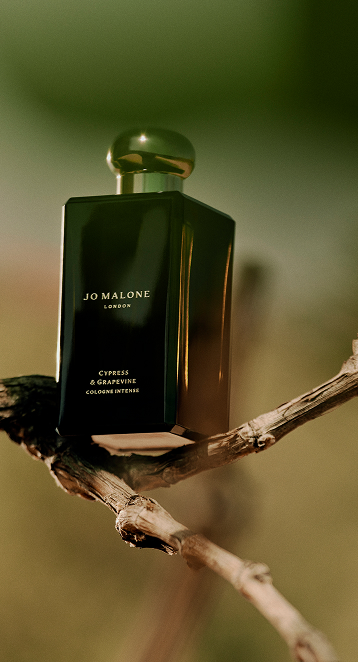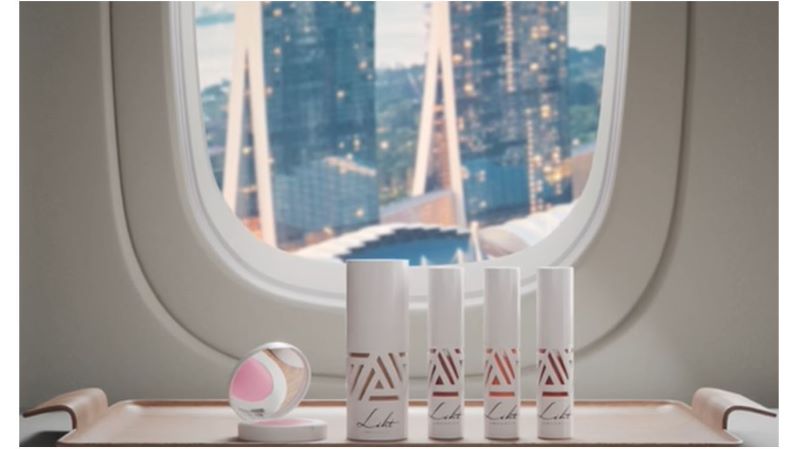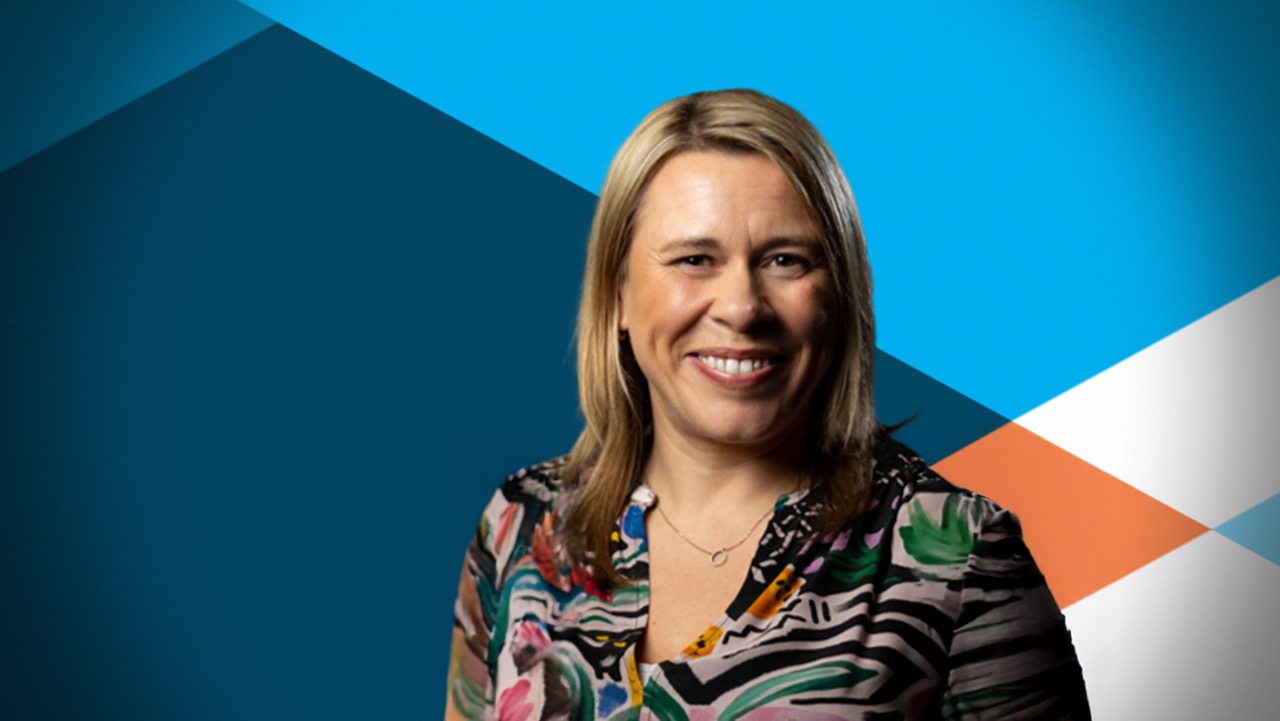INTERNATIONAL. This week in London at the annual Airline Retail Conference (ARC) in London, inflight retail veteran Rakhita Jayawardena of King Power Traveler was named Inflight Personality of the Year.
The accolade recognises his long service to the industry – this year Jayawardena celebrates his 30th year in inflght retail – as well as his contribution to progress and debate within the sector. Last month he spoke to The Moodie Report Chairman Martin Moodie about his life and times in travel retail.
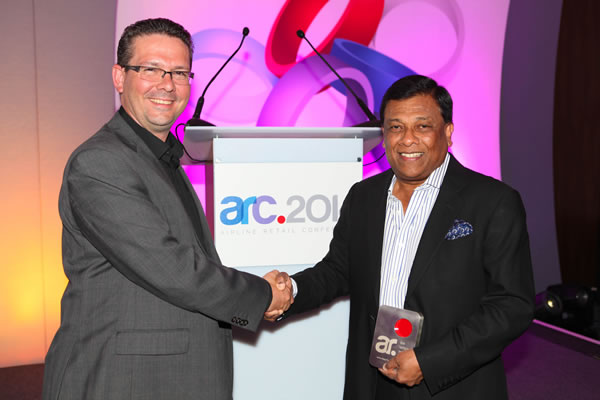 |
Rakhita Jayawardena accepts the ARC Inflight Personality of the Year award earlier this week in London |
The heights by great men reached and kept were not attained by sudden flight, but they, while their companions slept, were toiling upward in the night. -Henry Wadsworth Longfellow
He’s been called the founding father of inflight duty free. He’s driven one of travel retail’s greatest corporate social responsibility initiatives. He was the founding President of the Asia Pacific Travel Retail Association (APTRA). And he’s arguably the industry’s most ebullient and optimistic character.
Step forward Rakhita Jayawardena, the Sri Lankan inflight retail champion who this year celebrates 30 years in the business.
Today, as President of King Power Traveler (a partnership with Antares Cheng’s King Power Group Hong Kong) and the Founder of Centaur Travel Retailer, Jayawardena is enjoying a golden autumn to a career that ranks alongside his family and his country as one of the loves of his life. Indeed he has now stepped away fully from Centaur and handed the reins to daughter Yuvani as Managing Director/CEO, who is assisted on the Board by second daughter Aneeka. He left it in good shape – Centaur’s flagship brand Akita has become one of the most successful electronics brand worldwide in inflight retail.
Jayawardena senior’s story has been related a few times down the years but it doesn’t become any less fascinating in the telling. Professionally it began as a young General Manager at Sri Lanka Airlines, which was then in the course of transition from management by Singapore Airlines. One of the first Sri Lankans to take over from a Singaporean, he was charged with developing the then-fledgling business of duty free. His expertise and passion for the business would subsequently take him all around the world, from South Africa to New York, the UK to Hong Kong – and most places in between.
At Sri Lankan Airlines, Jayawardena transformed a “dormant, non-profit oriented activity into a profit-oriented passenger service”. It was, he says using a favourite phrase, “a paradigm shift” and he’s been agitating for change just about ever since.
Today, he argues, another such shift is taking place, as airlines all around the globe seek ways to drive a miscellany of ancillary revenues, just as airports have over the last 20 years in particular.
Disputing the “˜poor relation’ tag Rakhita Jayawardena becomes very animated on the subject of certain blue-chip brands turning their backs on the inflight business, supposedly for image reasons. Delivering the keynote address at February’s 2014 Airline Retail Conference (ARC) Asia Pacific, in Singapore he noted with concern “the emergence of strategic marketing changes with some of our supply partners”. “It was not so long ago that a major company in the fragrances & cosmetics industry made a decision to withdraw the sale of their brands from the entire inflight duty free retail market,” he said. “This was followed with another big company also pulling out their brand from a vast majority of the airlines. Some other companies are closely monitoring these changes and we believe are reviewing their brand positioning for the airlines, going forward.” He said this was “a real threat” to inflight retail. “There is a line that is being drawn by some of the bigger brand houses on where their product should be distributed and made available. The low-cost airlines and smaller national carriers in the Asia Pacific region are being unfortunately affected by these decisions. In a few high-profile cases [so are] the major carriers.” He emphasised that each partner in the travel retail chain is serving the same customers, whether as airport, airline or brand. “Therefore, if this passenger is denied the availability of a certain product or brand onboard their selected airline, but that same passenger can have the product available to him at the airport retail shops, is that fair and is it correct? Who are the brands partnering with? The travel retail industry – or just some of the travel retail industry? “Why is there selective distribution on offer to the passengers? Small or big, scheduled or low cost, the travelling consumer should be a valued passenger and potential shopper. Therefore, why have some of the supply partners begun to treat the airline customers differently? “Such practices not only show contempt for and, I believe, commercial differentiation against, the airlines but contempt for the travelling consumer by dictating where they can buy. And it’s short-sighted.” “As I’m speaking on the subject of partnership it is appropriate for me to stand here and make a clarion call to all brand houses that target the travel retail channel to stop this so-called selectivity in the positioning of their brands within the airline industry. “Having said that I wish to take this opportunity to applaud some of the major brand houses who have stood firm and continued to provide their products, irrespective of whether it is a large legacy carrier or a small national carrier or a low cost carrier. They are real qualitative partners as they recognise the importance of service to consumers irrespective of the clothes they wear, their class of travel or the carrier of their choice.” He concluded by highlighting the importance of trust in industry partnerships. “Trust is non-negotiable. It also needs to be unreserved, unambiguous and unequivocal.” |
“This has got tremendous momentum,” he says. “Many carriers are appointing ancillary managers and ancillary revenue has become a core part of the activity of the airlines. It’s the fourth element of inflight service – the drinks, the food, the entertainment and the shopping service.”
But back in his early Sri Lankan days things were very different. Internal recognition was one thing, getting the industry to take notice was just about impossible. Not for the final time in travel retail, inflight shopping was deemed a poor relation of the industry by certain suppliers.
But Jayawardena, and Sri Lankan, punched above their weight, astounding a largely ignorant industry by winning major accolades at the Frontier Awards in 1984 and 1986. “We were rated among the best retailers in the world. Can you imagine – from an island country which a lot of industry people didn’t even know where it was!” he says with his trademark thunder of a laugh.
“MAD PEOPLE CHANGE THE WORLD”
Famously, Jayawardena then departed for his first external consultancy, with South African Airways. But it wasn’t any normal consultancy for South Africa was a very different country back then.
“It was the height of apartheid,” he recalls with emotion, “and here was a coloured man, as they would say back then, being given a contract.”
What was that like for him? How did he feel as a young man from Sri Lanka going into the very white man’s world of South Africa?
“There were many divisions [for whites and non-whites] – the beaches, the lavatories and so on. However, I must say that the board of South African Airways, which was an all-white board, was absolutely fair. Otherwise they would not have given me the job. They recognised my skill, they recognised my talent, and then they gave me the job to completely revive and re-launch the inflight business.
“I still remember when I first presented to the South African board. At the time that they were having to fly around the Cape because of all the restrictions on them. And also they didn’t have much merchandise, because there were heavy restrictions and no-one was selling to them due to all the embargos.”
Perversely, in hindsight, it was a “coloured man” [to use their parlance, not ours -Ed] who was able to secure supply. Having secured the contract, Jayawardena’s extensive network ensured that he could source a range of big international brands.
“I saw the opportunity that if we could get products and brands onboard, we could sell to the people and that’s exactly what we did. We managed to get all the brands we wanted.”
But the biggest breakthrough came when Jayawardena famously convinced the management to remove several seats from various aircraft to allow more duty free trolleys onboard. “I told them, “˜I’ll give you more revenue if you give me more space on the aircraft’. I made this presentation to remove seats and somebody on the board said that I was mad because the airline’s core business was to sell seats.”
Jayawardena recalls his reply as if it was yesterday: “˜Yes, sir. It’s the mad people that change the world.’ “And then they removed the seats.”
But it was far from madness. From there progress was rapid and impressive. Spend per passenger (not customer) rose to US$18, which was the highest for any scheduled carrier in the world ever, Jayawardena claims, and particularly noteworthy given that retail prices were a lot lower back then.
“I remember that we made more revenue from duty free than we did from the mail revenue, which was also high at the time.”
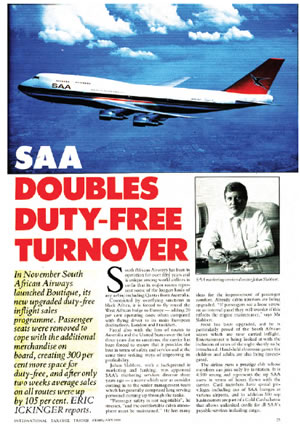 | 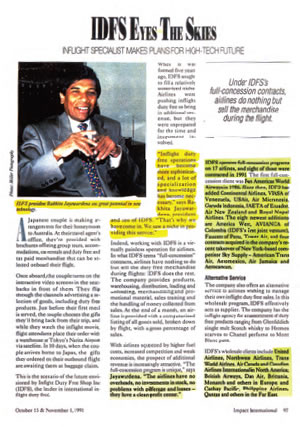 |
“I said: ‘I’ll give you more revenue if you give me more space on the aircraft.’ I made this presentation to remove seats and somebody on the board said that I was mad.” But the formula worked and South African Airways’ duty free sales soared. | |
HELPING TO CREATE A GLOBAL GIANT
Jayawardena’s next big move came with a move to the USA, where he took over as President of the world’s biggest inflight concessionaire of the time, IDFS, working with the mercurial Jean-Marcel Rouff. The Sri Lankan played a big role in the rejuvenation of IDFS, which became the first truly global inflight concessionaire, driven largely by Jayawardena’s success in securing a flurry of Asia Pacific accounts.
“We put our footprint all over the world,” he remembers. “Plus it was a unique model; we were actually the exclusive inflight distributor for all the brands in America.”
The rejuvenation was complete, and ultimately IDFS would be sold to Duty Free International for 15 times earnings. With his job done, Jayawardena stepped out of the limelight for a while. But not for long. I remember as Editor and Managing Director of Duty-Free News International in the late 1990s being summoned by then-Alpha Group boss Paul Harrison to the company’s headquarters near Heathrow Airport. “Who would you hire if you wanted the guru of inflight duty free to drive your business?” he demanded of me.
The answer was obvious. Jayawardena was back, this time heading Alpha Onboard Sales & Services, a joint venture between him and the UK plc Alpha Airports Group. That marked the beginning of an intensely competitive period in the inflight retail world. As BAA struggled to come to terms with its new acquisition (later bought back by Rouff after BAA closed the business), Benny Klepach’s Miami-based DFASS emerged as a growing force and Alpha OnBoard Sales & Services successfully chased down a number of accounts.
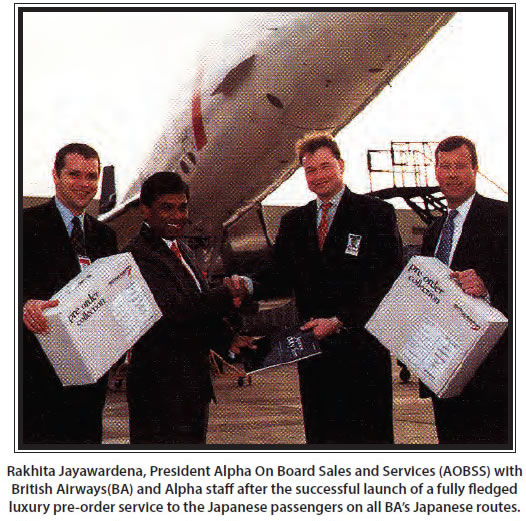 |
After his time with Alpha ended, Jayawardena decided it was time to relocate from the UK (though he still keeps a house there) to his homeland in Colombo, saying at the time “it was time to rest for a while under the coconut palm trees in Sri Lanka”.
POWERING UP
 |
Since joining forces with King Power Group Hong Kong’s Antares Cheng (above), Jayawardena has successfully driven an Asia Pacific inflight business mainly targeting smaller airlines |
But rest and Rakhita Jayawardena are not natural bedfellows. Nearly ten years ago, in August 2004, he joined his long-time industry friend Antares Cheng (Managing Director of King Power Group Hong Kong) in an inflight retail partnership called King Power Traveler. All logistics, warehousing, operational, administrative and financial activities were based in Hong Kong while business development and supplier relations happened out of Sri Lanka where Jayawardena was also developing his own successful product supply business called Centaur Travel Retail (with which, as stated, he has now cut his ties).
Over the past decade King Power Traveler has focused on a wide range of niche accounts, often on smaller airlines, rather than trying to chase down the bigger national carriers where the price of entry via open tenders can seriously compromise profitability. Recently King Power Traveler strengthened its burgeoning inflight duty free portfolio via four new contracts with VietJet Air, Air Vanuatu, Solomon Air and Golden Myanmar. It also announced an exclusive wholesale supply service contract with VietJet Air, the first privately owned airline in Vietnam.
“We have been focusing on the middle to smaller airline market business and not with the big ones at the moment,” he says. “I find that if I double my business on a small carrier it’s like getting two carriers. We’ve gone to places like Mongolia, Bhutan, Papua, New Guinea and Myanmar, where we have pioneered the concept of full concession inflight retailing in new markets.
“The competition is really stiff for the major Asian airline accounts and you have to bid very high to win them. So therefore, we have gone into territories that other people have not ventured into. And we have developed a good quality long-term business with all our partners.”
Inflight retail does not win everyone’s favour though. A number of high-profile brands have withdrawn in total or in part from the channel (see sidebar), while many suppliers claim they get paid slowly (and sometimes not at all) on too many occasions. What is Jayawardena’s view?
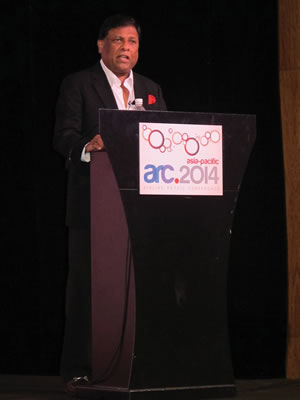 | 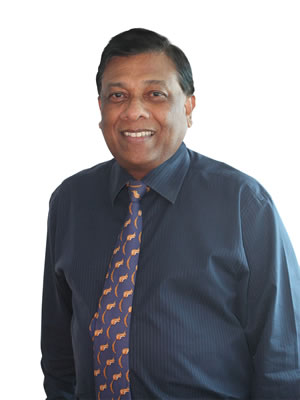 |
Rakhita Jayawardena: “I’m in the business that I love. I’ve achieved a level of contentment.” | |
“As far as I’m concerned, I’ve done 30 years of retailing, and one of the primary things is that I have respected supplier relationships,” he replies. “They’re key strategic partners for inflight retailing or for any retailer. And we have got to respect the terms and conditions with which we trade.
“Suppliers are the most important link in the whole chain. And therefore, when terms are agreed, I honour the terms. I do not delay their payment. I have never delayed. So in other words, we stay on time and we respect our suppliers. They give us good terms, and if they have given us good terms, then we have to honour those terms, stay on time.
“That’s number one. Number two, I also do one thing more, because there are buy-back processes in all the inflight retail contracts [sale or return -Ed]. And I work very hard to ensure that I do the least amount of returns to our suppliers. That’s because I understand their concerns that they sell something to a retail customer, then suddenly they get old stuff coming back. And it throws their whole P&Ls out of sync.
“It’s about understanding their concerns. I have put certain controls in place with my organisation so that we cannot send any returns to suppliers until I have signed them off.”
Thirty years is a long time in retail. The ambitious young man from a small Asian island country all that time ago has grown into the elder statesman of inflight retail. So what does the future hold for Rakhita Jayawardena?
He pauses for a moment, then answers: “You know, the word contentment is very, very important. But it’s a word that people do not always come to terms with. We talk of success, we talk of achievement. But if you can achieve contentment in your life, then, I believe, you’ve got a good balance.
“So after having developed the largest inflight retail and supply company in the world; having done a similar thing with the UK; and having pioneered some smaller airline business in Asia, as well as enjoying the relationships and friendships I have developed over the years, I am content. I’m in the business that I love, right? I’ve achieved a level of contentment.”
He also pays rich tribute to his wife, Yasmin, “my constant supporter, who has stood behind me in everything I do, including spending so much time away from home while she raised my beautiful girls and made them her constant focus. Without her love and backing, none of this would have been possible.”
His most special moment over the three decades.? There can only be one: his and fellow industry figure Paul Topping’s leadership of the Alpha Sri Lanka Tsunami Relief Fund – the extraordinary travel retail industry response to the tragic tsunami of Boxing Day 2004. Amazingly the fund raised enough money to rehouse a whole community that had seen its village totally wiped out by the disaster.
“That was a defining moment for me and maybe for our industry,” he says. “Because I saw the value of our industry. Because when we called for action, people reacted and rallied around. It was so spontaneous, the generosity of the people who responded was amazing. People like Colm McLoughlin and George Horan at Dubai Duty Free went above and beyond the call of duty.”
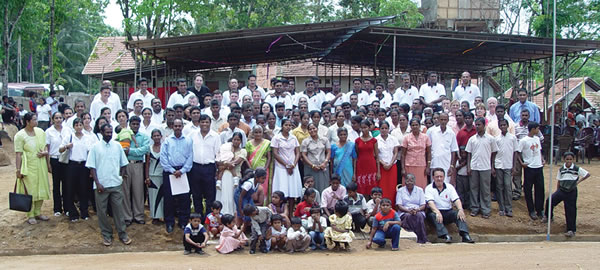 |
One of travel retail’s great Corporate Social Responsibility initiatives culminated in the 2006 opening of The Travel Retail Village, the industry’s response to the 26 December 2004 tsunami |
 |
Rakhita Jayawardena with Paul Topping (right), the two driving forces behind the building of a new village for the displaced people of Palliyawatta |
Jayawardena is convinced that the industry as a whole, and not just individual companies, should emphasise Corporate Social Responsibility more – and do much more on a collective basis.
“We are all the time hammered with threats to cigarettes, liquor and so on. We are always fighting battles in various markets. But we should do more that is positive as an entity, like maybe giving eyesight to those who can be cured or prevented from blindness.
“If we could really build up a big momentum and go to the developing countries and give people eyesight, my goodness me, wouldn’t that be amazing?”
Time and again down the years of knowing the irrepressible force and personality that is Rakhita Jayawardena, I have heard him quote the words of Henry Wadsworth Longfellow that begin this article. He has indeed toiled upwards over many nights. But equally, he has truly reached great heights.


